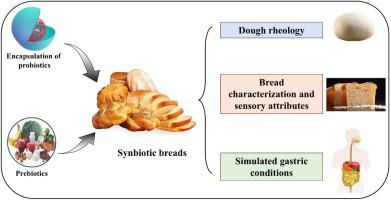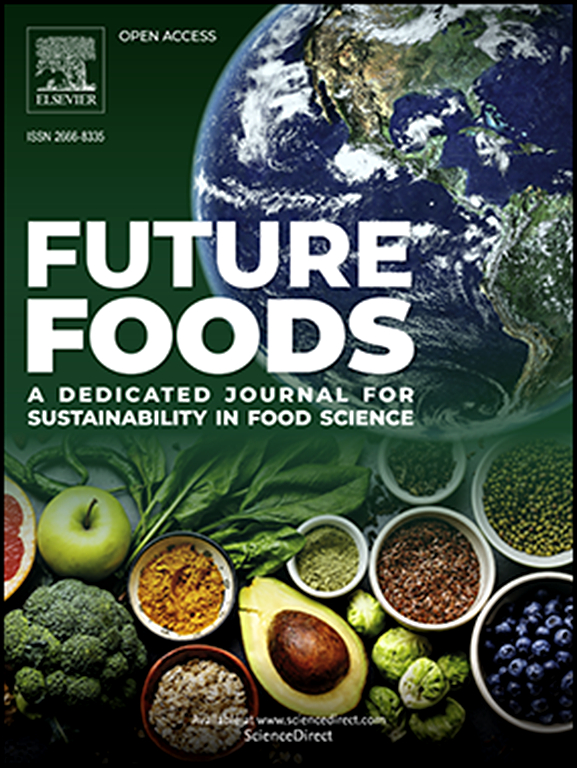Enrichment of bread with encapsulated probiotics as a functional product containing bioactive compounds: Principles, outcomes, and challenges
IF 8.2
Q1 FOOD SCIENCE & TECHNOLOGY
引用次数: 0
Abstract
Bread is a well-known and popular product among people around the world. The processing stages involved, from flour milling to baking, can result in the degradation or loss of certain nutritional and bioactive compounds. Enrichment of bread with probiotics, despite their health-promoting properties and the production of a new product with high competitiveness at the commercial level, has challenges in terms of technology and production. For this study, articles were selected by order of preference in Web of Science, Scopus, Scimago, PubMed, Science Direct, Functional Food Science Publisher, Google Scholar and Google from 2000 to 2025 using a combination of the following keywords: “Enrichment”, “Fortification”, “Probiotics”, “Prebiotics”, “Synbiotics”, “Encapsulation”, “Bakery products”, “Bread”, “Cereals”, “Baking”, “Survival”, “Viability”, and “Bioactive compounds”. Accordingly, the challenges for incorporating probiotics into synbiotic breads, types of probiotics and functional synbiotics in bakery products, new and common methods for encapsulation of probiotics for enrichment of different synbiotic breads, application of encapsulated probiotics in enrichment based on the types of breads, and thermal stability of probiotics during baking are discussed. Breads containing encapsulated probiotics produced on a commercial level and the therapeutic properties of these breads are also investigated.

用包封的益生菌作为含有生物活性化合物的功能性产品对面包进行富集:原理、结果和挑战
面包是一种众所周知的、受世界人民欢迎的产品。所涉及的加工阶段,从面粉研磨到烘焙,可能导致某些营养和生物活性化合物的降解或损失。在面包中添加益生菌,尽管具有促进健康的特性,并且生产出在商业层面具有高竞争力的新产品,但在技术和生产方面存在挑战。在本研究中,根据2000年至2025年期间Web of Science、Scopus、Scimago、PubMed、Science Direct、Functional Food Science Publisher、谷歌Scholar和谷歌中文章的偏好顺序,使用以下关键词组合选择文章:“浓缩”、“强化”、“益生菌”、“益生元”、“合成”、“胶囊”、“烘焙产品”、“面包”、“谷物”、“烘焙”、“生存”、“活力”和“生物活性化合物”。因此,本文讨论了益生菌在合成面包中的应用挑战、烘焙产品中益生菌的种类和功能性益生菌、益生菌包封在不同合成面包中的新方法和常用方法、包封益生菌在不同类型面包中的应用以及益生菌在烘焙过程中的热稳定性。在商业水平上生产的含有胶囊益生菌的面包和这些面包的治疗特性也进行了研究。
本文章由计算机程序翻译,如有差异,请以英文原文为准。
求助全文
约1分钟内获得全文
求助全文
来源期刊

Future Foods
Agricultural and Biological Sciences-Food Science
CiteScore
8.60
自引率
0.00%
发文量
97
审稿时长
15 weeks
期刊介绍:
Future Foods is a specialized journal that is dedicated to tackling the challenges posed by climate change and the need for sustainability in the realm of food production. The journal recognizes the imperative to transform current food manufacturing and consumption practices to meet the dietary needs of a burgeoning global population while simultaneously curbing environmental degradation.
The mission of Future Foods is to disseminate research that aligns with the goal of fostering the development of innovative technologies and alternative food sources to establish more sustainable food systems. The journal is committed to publishing high-quality, peer-reviewed articles that contribute to the advancement of sustainable food practices.
Abstracting and indexing:
Scopus
Directory of Open Access Journals (DOAJ)
Emerging Sources Citation Index (ESCI)
SCImago Journal Rank (SJR)
SNIP
 求助内容:
求助内容: 应助结果提醒方式:
应助结果提醒方式:


